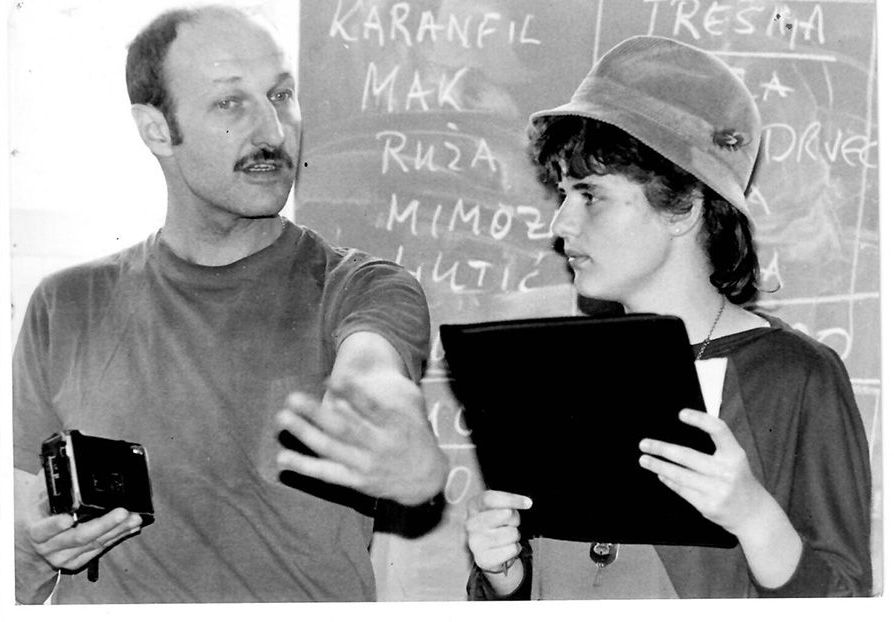
Photo: A bilingual poetry writing workshop at the Centre for Teaching Foreign Languages, Belgrade (1984)
Malcolm Hebron (UK)
Richard Berengarten: an editor's appreciation
For some years I have had the pleasure of publishing poetry and prose by Richard in a British educational journal, The Use of English. This is published by the English Association, a longstanding organisation devoted to supporting the discipline of English (language and literature) at all levels, from primary to tertiary. The Use of English is directed particularly at teachers at secondary level and Further Education (post-secondary courses which do not form part of an undergraduate degree). It is a great pleasure to contribute to this celebration of Richard at 80 by sharing his distinguished contribution to our pages.
My first contact with Richard came when he submitted a number of poems from the sequence ‘Rough Diamonds’. I was naturally very honoured to receive work from a writer of such standing, and it was then that a long and, to me, immensely valued correspondence began (we have never met in person), over which he has introduced me to other writers and publishing outlets in his extensive network. Other poems followed, characterised by formal intricacy, immense intellectual range and a precise and resonant lyrical voice. There is also, of course, an international sensibility, too often absent from the world of English letters. I think for example of The Wine Cup, which we also had the privilege of publishing in part, a series of villanelles dedicated to, and inspired by, the Chinese poet Tao Yuanming. Here a demanding Western form becomes the vehicle for graceful, contemplative work that reaches out to a non-western sensibility.
Besides his own verse, Richard has also published with us a series of poetry workshops, which may be used in schools or any writing group. In these, he shares some of his experiences as an educator, showing how a form such as the haiku may be introduced to a workshop group, who then produce their own work to various prompts. This is the kind of material an editor of an educational journal dreams of - lucid exposition, and a generous sharing of work by writers from different parts of the world. To read pieces by, for example, a young writers’ group in Serbia, is a forceful reminder of the universality of the endeavour of poetry. Richard has also written directly, and passionately, on the vital importance of that endeavour in the form of manifestos. His work as a whole exemplifies and elaborates upon the central human value of literary expression, against the prevailing currents of utilitarian and philistine drabness.
I have avoided describing myself as Richard’s editor, as that sounds far too grand. But in fact, when it comes to the workshop articles, Richard will always ask for editorial comment. The pieces are so scrupulously worded that it is extremely hard to find anything that could be altered at all, but I eventually mange to make some timid suggestions which Richard adopts with embarrassing gratitude. One thing that strikes me about Richard as contributor, and writer, is a deep quality of respect - respect for the art of poetry first and foremost, and also for the form he is employing, for the students he works with and the readers he addresses. A courtesy which is, indeed, courtly. I am sure that others will speak of his indefatigable nature as thinker and writer, and the deep curiosity and humanity of his voice. We have certainly been fortunate to have that voice in our pages, and I can only end with heartfelt thanks and an editor’s plea for more!
References
Richard Berengarten (2020), ‘Poetry Workshop 1: Such Stuff as Dreams’. The Use of English, Vol. 72/1, pp. 28-34.
Richard Berengarten (2021), ‘From Rough Diamonds’. The Use of English, Vol. 71/3, pp. 83-89.
Richard Berengarten (2021), ‘Poetry Workshop 2: 'Riddles, Puzzles, Guessing Games’. The Use of English, Vol. 72/2, pp. 56-65.
Richard Berengarten (2021), ‘Poetry Workshop 3: 'Go: the Chant and the Envoi’. The Use of English, Vol. 72/2, pp. 47-58.
Richard Berengarten (2022), ‘A Poem for Ukraine'. The Use of English, Vol. 73/3, pp. 78-79.
Back to introduction here.
Next contribution here.

